Report of Seminar On Science & Metaphysics A Muslim Perspective : Session 02
| |
Session 02
A Study of Muslim Thinkers
|
| |
|
MUSLIM Institute organized a seminar on "Science & Metaphysics: A Muslim Perspective" on Thursday April 26, 2018 at National Library of Pakistan, Islamabad. The Seminar consisted of two sessions. Second session “A Study of Muslim Thinkers” was Chaired by Prof. Dr. Suheyl Umar (Former Director Iqbal Academy, Pakistan & Member Advisory Board, MUSLIM PERSPECTIVES Journal). Mr. Ahmad Al-Qadri (Research Associate of MUSLIM Institute) moderated the proceedings of second session. Researchers, students, academicians, representatives of think tanks, journalists, political leaders, and people from different walks of life participated in the seminar.
Brief Summary of the views shared by the Speakers is as under:
|
|
Science and Spirituality: Iqbal’s perspective
Mr. Idrees Azad
International Islamic University, Islamabad
|
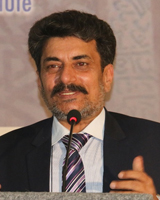 |
|
Iqbal identified and signified every individual in the universe as a distinctive entity. One as a conscious being needs no impression to be sure of oneself. Every being must have the quality of imaging itself as the being. So, every ego has its sense of existence. This very sense of existence is the crux of Iqbalian Khudi. Iqbal categorized the mystic seekers as the ‘observer’ and ‘absorber’ of the reality. Iqbal says in his third lectures that all search for knowledge is essentially a form of prayer and the scientific observer of nature is a kind of mystic seeker in the act of prayer. In the words of Rumi if one follows the foot prints of a deer then consequently deer’s musk become his guide. Iqbal elaborates it and says that a scientific observer is following the foot prints only (notwithstanding the musk) at present which is modestly limiting his method of quest. This alone will add to his power over nature and give him that vision of total infinite which philosophy seeks but cannot find. That is why Quran always favors observational knowledge because it is the way a seeker should adopt. Iqbal declared both scientists and the Sufis as mystic seekers. However, stages are different as scientists follow the foot prints and observe the reality. While, Sufis follow the master plan of Universe. In a nutshell, Science wants to find reality into bits and pieces while spiritualism wants to embrace the reality as a whole.
|
|
|
Imam Al Ghazali on Science Religion and philosophy
Mr. Muhammad Usman
Lecturer, University of Central Punjab, Lahore
|
 |
|
Imam Al-Ghazali has been acknowledged as an intellectual polymath because of his diverse ideology. Today, there is misconception about Al-Ghazali that he was the opponent of Philosophy and Science. He criticized a few philosophical concepts, not the philosophy as a whole. In his famous book Tahafut-Al-Falasifah (Incoherence of the Philosophers), Al-Ghazali raised reservations regarding philosophers endorsing improper application of logic in the subject of philosophy. He also objected arrogant and myopic behaviour of Muslim philosophers. In his book Maqasid-al-falasifah (Aims of the Philosophers), Al-Ghazali categorizes Philosophy into mathematics, theology, logic and physics. Imam shows no discontent with other philosophers on mathematics and accepts most of the thoughts regarding logic. However, he disagrees with major chunk of ideas on theology and partially accepts the principles of physics. On epistemology and philosophical ethics, he seems to be in agreement with his contemporaries and predecessors. Ibn e Khaldun designated Imam Al-Ghazali the founder of theology as he set new trends in this field. Books and thoughts of Imam Al-Ghazali like discussion on soul are seemed to be under influence of Muslim philosophers especially Avicenna.
|
|
|
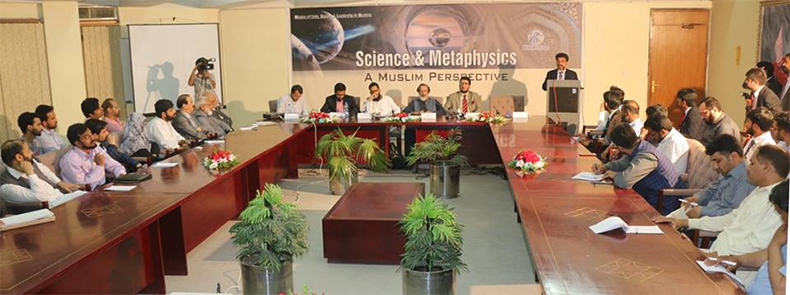 |
|
Cosmology: Ibn e Arabi, Iqbal & Modern Science
Mr. Muhammad Ali Shahbaz
Dept. of Physics, Quaid-i-Azam University, Islamabad
|
 |
|
Ibn e Arabi and physics are extremes of metaphysics and modern science respectively. Whereas ideology of Iqbal has balanced these two heights. According to Ibn e Arabi, cosmology is recognition and observation of Divinity. Universe is not only the collection of materialistic properties but also the expression of the Divine attributes. Ibn e Arabi preferred intuition over intellect to appreciate the divine features of universe. Intuition provides first-hand experience of the universal revelations while intellect is dependent upon mind and senses. Our five senses can only perceive apparent manifestations of the Divinity. However, reality of Divinity is beyond the scope of physical senses. Modern physics explains cosmology on the basis of the theory of relativity of Einstein and quantum physics. Big Bang Theory has been put forth to explain the emergence of the universe. However, cosmological ideology of modern physics is still under development. Critically assessing the modern scientific ideas, Iqbal presented a new description of materialism, life and conscience on the basis of the Holy Quran. Iqbal designated science the legacy of Muslims and urged the Muslims to comprehend the contemporary scientific revelations under the knowledge of Quran.
|
|
|
Ibn e Arabi’s Epistemology
Dr. Qaiser Shahzad
Associate Prof. Dept. of Comparative Religion, International Islamic University, Islamabad
|
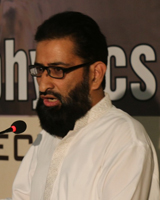 |
|
Ibn e Arabi’s Epistemology does not have foundational status that we can easily find in the critical tradition of philosophy. He emphasized moral and practical dimension of knowledge. According to him, a lazy scholar is far better than an active ignorant. It reminds us the difference between reason and passion while talking about rational faculty except qualities of excellence. For Ibn e Arabi, knowledge is a never ending journey. Philosophically, since he believes in perpetual creation of the universe, he teaches that one never arises at the final destination in the journey of knowledge. He says that a human being seek knowledge in two fundamental ways. One is intuition and the second is an instrumental way either through sense perception or through reflection. Reflection is the power to synthesize facts in order to reach conclusion. Reason is follower of reflection. He says that reason recognizes God through His signs. The reason of reflection can be valid or invalid. So reason is knowledge based reflections which are not incontrovertible and could also accidental. Ibn e Arabi differentiates knowledge from Marifa and defines the later. A knowledge which can be actualized only through piety, practice and terms.
|
|
|
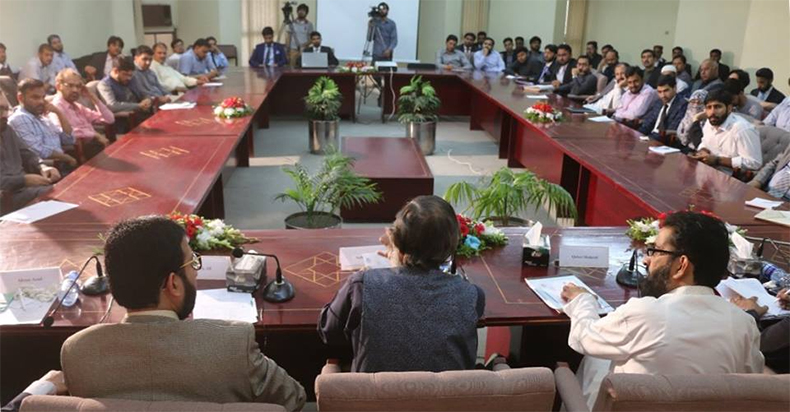 |
|
Remarks of the Chair
Prof. Dr. Suheyl Umar
Former Director Iqbal Academy, Pakistan & Member Advisory Board, MUSLIM PERSPECTIVES Journal
|
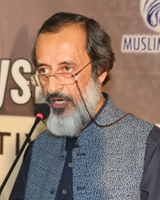 |
|
How the behavior of photons and non-locality can be interpreted? In this respect, experimental results are being observed in laboratories. Bohm has successfully described it as the wholeness and the implicate order and if one analyze it carefully it is the same thing which is described by the Holy Quran. In the words of Mujadid Alif Sani, there is an implicate order in which everything is frozen. Numerology is different from mathematics and Imam Al-Ghazali didn’t oppose the mathematics. Moreover, Imam Al-Ghazali used the logic in the studies of Islamic jurisprudence which was criticized at that time but later on it became the inevitable practice.
There is a famous saying of Ibn e Sina (Avicenna) that any such knowledge of physics is useless that doesn’t lead into the direction of a certain principle. Teachings of Imam Al-Ghazali and Ibn e Arabi are the same with different disposition. Wahdatul Wajood is misunderstood as Pantheism whereas doctrine of pantheism is narrow and Wahdatul Wajood is a very broad.
Bounds of knowledge can’t approach the divine reality and in the words of Ibn e Arabi, it is an ocean without shore. The more you gain the knowledge the more your thirst increases. In the words of Huston Smith, vaster the shore of knowledge the greater is the ocean of ignorance.
|
|
|
Vote of Thanks
Sahibzada Sultan Ahmad Ali
Chairman, MUSLIM Institute
|
 |
|
I want to pay my heartiest gratitude to the speakers and the participants of the seminar. It was a very fruitful discussion in both the sessions. We need to do much exercise to digest and deeply understand the ideas put forward in today’s discussion and for that purpose we need to seek the answers of those questions which have been raised today. Thank you very much.
|
|
|
| |
Interactive Session:
|
| |
 |
|
Brief summary of the interactive session is as follows:
Khudi is Unique and khudi is united at the same time. Self is unique in every individual and the self is united with great oneself of God. Somebody asked Allama Iqbal that if someone will confront infinite ego then whether he will be able to withstand or he will merge in it? Iqbal replied that in a sunny day when someone come out with candle in his hand then light of candle will disappear in the light of sun but still the candle will indicate its existence.
In short, Mysticism is to observe the divine not with intellect or senses but through spiritual mean. Both Iqbal and Ibn e Arabi believe that intuition is more trust worthy source of wisdom than mere reasoning.
God is not even the Higgs field because if Higgs field is creating the mass so there must be God in form of Higgs field. God is Ultra-dimensional as Einstein also said that God is Multidimensional and his dimensions are countless.
Imam Al-Ghazali has summarized the scientific and philosophical thoughts of his contemporaries very effectively and one can observe that these people were very advance vis-a-vis space and time. He unifies the discussion about symmetry of space and beginning of time around eight centuries before the mathematical models presented by Einstein. Al-Ghazali never opposed studying the science and mathematics rather he opposed the idea of classical determinism which has also been refuted by modern physics.
|
| |
Download pdf
Newsletter
Share
Releated Publications









